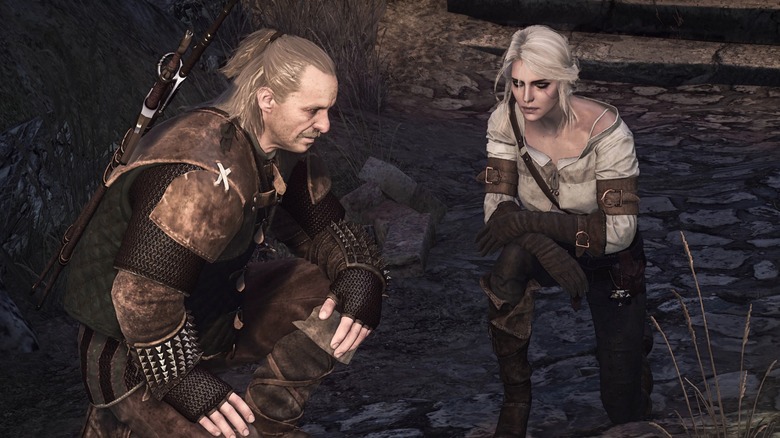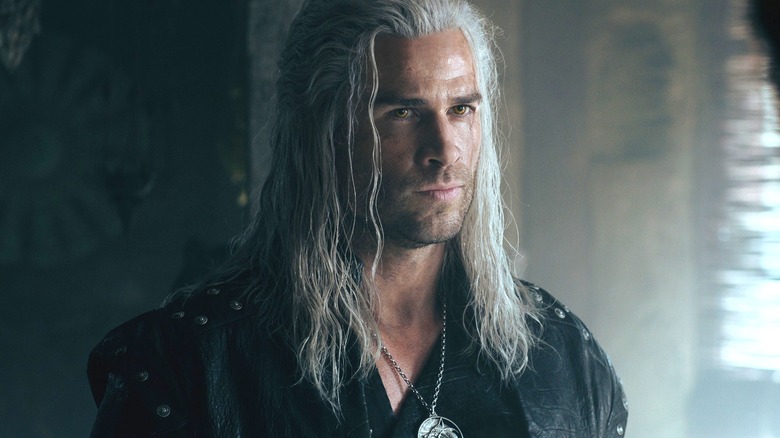This post contains major spoilers for Netflix’s “The Witcher,” its source material, and “The Witcher 3: Wild Hunt.”
It shouldn’t be controversial to state that the latest season of “The Witcher” suffers from inconsistent storytelling. Even so, some chunks of the narrative are crafted well enough, like Ciri’s (Freya Allan) moral decline during her time with the Rats or Vilgefortz’s (Mahesh Jadu) drastic fall from grace after the battle at Montecalvo. While the major beats of the story remain faithful to Andrzej Sapkowski’s “The Witcher” novels, the execution remains muddled enough to cast doubts over the future of the franchise. But the most egregious example of the problems that plague season 4 of “The Witcher” lies in a shocking character death that completely shatters canon. What’s more, the series fails to justify this critical narrative decision — or simply doesn’t bother to do so.
In the books, Montecalvo is the seat of power for the Lodge of Sorceresses, but the castle itself was never used as a literal battlefield, as is the case in the series. This brings about a ton of changes to canon, including an inversion of roles between Yennefer (Anya Chalotra) and Francesca (Mecia Simson), along with the involvement of witchers from Kaer Morhen. Vesemir (Peter Mullan, replacing Kim Bodnia in season 4) is present too, and he trains the mages while swearing to protect the stronghold by fighting Vilgefortz. And he does, but this confrontation is woefully short, as Vilgefortz viciously kills Vesemir. “For my son, Geralt,” the master witcher utters before dying, but the impact of these words is overpowered by the injustice of an integral character being killed off just for the sake of it.
While “The Witcher” has drastically steered away from canon before, this Vesemir moment feels insultingly hollow for a reason.
The Witcher 3: Wild Hunt makes its heartbreaking Vesemir moment count
Vesemir is alive and well at the end of Sapkowski’s “Witcher” saga, but the character does die in “The Witcher 3: Wild Hunt.” But Vesemir’s video game death is emotionally poignant, and directly shapes Ciri’s stance against the biggest threat gripping the Continent. Vesemir is introduced alongside Geralt in the game’s prologue, and these quiet moments are enough to establish the paternal role he plays in the titular witcher’s life. Both the game and the show showcase Ciri’s time at Kaer Morhen; while the show makes good use of this arc to endear us to him, Vesemir’s unceremonious death at Montecalvo renders this solid foundation completely futile.
Circling back to game canon, we encounter Vesemir a couple of times during Geralt’s journey, but the Battle of Kaer Morhen marks a crucial turning point in the story. Ciri, who is being hounded by The Wild Hunt for her Elder Blood, is able to reunite with Geralt and head to the witcher stronghold to prepare for a long and arduous battle. Vesemir fights valiantly against two major antagonists — Imlerith and Eredin Bréacc Glas — and even manages to wound them while keeping Ciri safe. In a tragic turn of events, Imlerith snaps Vesemir’s neck, which deeply traumatizes Ciri and fuels her decision to combat The White Frost.
This pivotal death is supposed to numb you, as Vesemir doesn’t share such a fate in the books. But “The Witcher 3” makes it count by using it as a catalyst for the last leg in Ciri’s fight against The Wild Hunt. The story treats this moment with the emotional gravitas it deserves, as Vesemir’s sacrifice weighs heavily on Geralt and Ciri, along with every other witcher who trained under him.
Netflix’s Witcher adaptation fails Vesemir and, by extension, Geralt
“The Witcher 3: Wild Hunt” also breaks canon, but does so in a way that feels sincere and hard-hitting, without reducing Vesemir to just another casualty. The Montecalvo battle in the series is not a problem in itself, but Vesemir’s involvement unnecessarily complicates matters and situates him somewhere he shouldn’t be. That said, I do believe that Vesemir’s death at the hands of Vilgefortz could’ve been impactful if it had been written well, but the series’ shoddy execution only draws a feeble parallel to the Geralt-Vilgefortz fight in season 3. After all, there’s something poetic about Geralt’s father figure dying while enacting revenge on the mage who left his son at the brink of death. But these nuances aren’t fleshed out, and the fight is over before the shock can sink in.
There’s also Vesemir’s abilities, which have been framed in an underwhelming light throughout the season — in fact, none of the witchers at Montecalvo are a part of any impressive fight sequences. After the battle ends, Yennefer mourns Vesemir as one of many casualties. This doesn’t feel right, given his importance in Geralt’s life. Later on, Geralt (Liam Hemsworth) and Yen reunite and Vesemir is mentioned, but our witcher doesn’t react to this death at all, which is extremely out of character.
Geralt might not be the most emotionally forthcoming individual, but Vesemir means a great deal to him as a mentor and paternal figure. Geralt brushing off his demise is egregious, but the series makes it seem like an inevitability, like an unpreventable consequence of war to be accepted with grace. No matter how you feel about the show, Vesemir, the Last Master of Kaer Morhen, deserves better.
Season 4 of “The Witcher” is currently streaming on Netflix.

